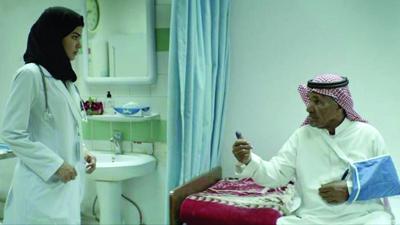A simple story told with the drama conveyed through subtly observed details, “The Perfect Candidate” is a fine example of blending serious themes, comedy and social comment. It’s also one of just a handful of features shot entirely in Saudi Arabia, and the second picture directed by a Saudi woman.
Handsomely produced, well-intentioned and well-acted, Haifaa Al-Mansour’s movie deals with an independent-minded young woman doctor and has an unmistakable feminist theme. The film’s message is clear: Saudi women are oppressed and virtually negated in a male-dominated social structure, but it rigorously avoids sanctimony and, until its final scenes, sentimentality.
The main character, Dr. Maryam Alsefan (an outstanding Mila Al-Zahrani), works at a small-town hospital and is confident enough to treat elderly men who demand to be touched only by male doctors and stubbornly defend her diagnoses to skeptical colleagues, much to the dislike of her scowling supervisor. When Maryam hears of doctor recruitment in Riyadh, she books a flight to the city’s medical convention.
Her flight permit has expired, however, and with no adult relative to vouch for her, she has to cancel the trip. Unbowed, Maryam decides to focus on a muddy, washed-out road in front of the hospital. The road is in such terrible shape that ambulances carrying the injured and sick can’t get to the hospital entrance. Maryam hits on the idea of running for a seat on the municipal council, which offers her a chance to get the road paved. By custom, this is unheard of — women simply don’t run in elections.
In a secondary plot that awkwardly runs parallel to Maryam’s story, her sad-eyed, kindly father Abdulaziz (Khalid Abdulraheem) has his own issues. He’s a musician, a master of the oud, but, because of the government’s corrupt ways, he has to start at the bottom with his group to be considered for a coveted spot in the Saudi National Band. More importantly, he has to contend with the fear of violence committed by religious extremists.
Without calling attention to itself, the movie uses the political framework to make numerous points about the status of women in Saudi Arabia. She is constantly reminded that her mother was a wedding singer whose voice was offensive to men.
Overt signs of womanhood must be kept far from the male gaze, so Maryam has to address the men at a campaign meeting by means of video. Yet she engages in what is a serious act of disobedience; in a fit of anger, she strides out from behind the cameras and confronts the male audience.
Maryam’s scenes with her sisters Selma (Dae Al-Hilali), a wedding photographer, and Sara (Nora Al-Awad), a sullen teenager, are high-spirited and realistic; they are the film’s best moments. Their teasing interactions and their arguments always feel natural and convincing.
The script (by Al-Mansour and Brad Niemann) placidly makes many telling points about a heavy-handed culture, yet it also rushes in a pat Hollywood manner to tie up loose ends before the finish. However, it also gives us something positive at the end — the possibility of change.









